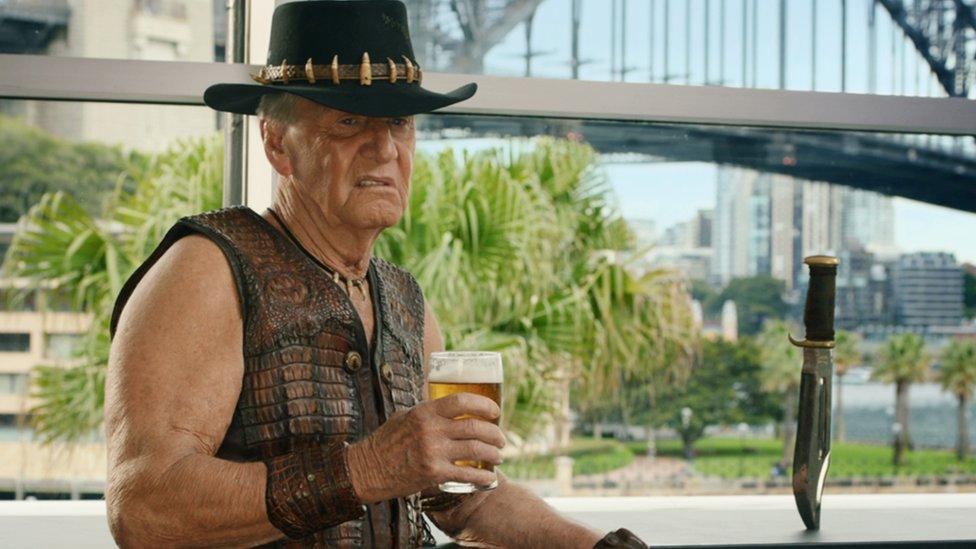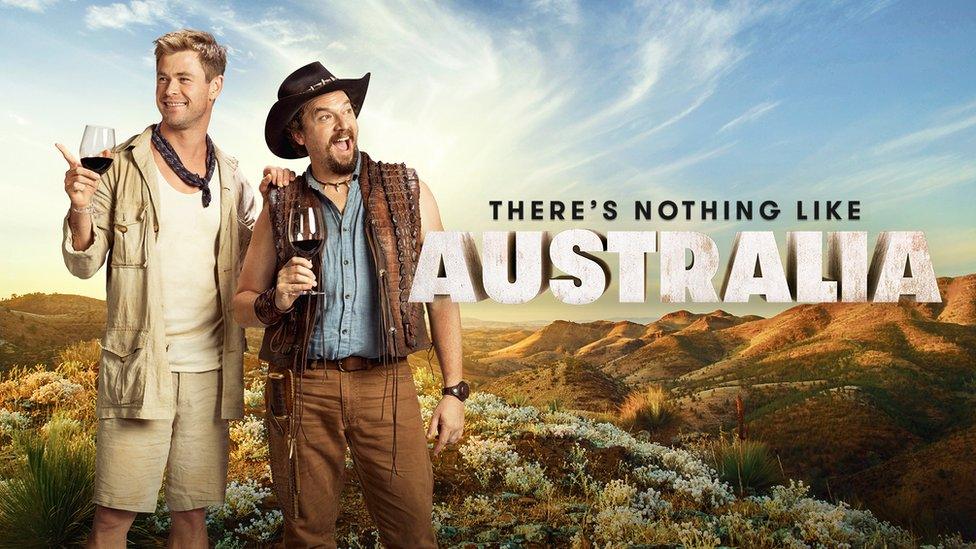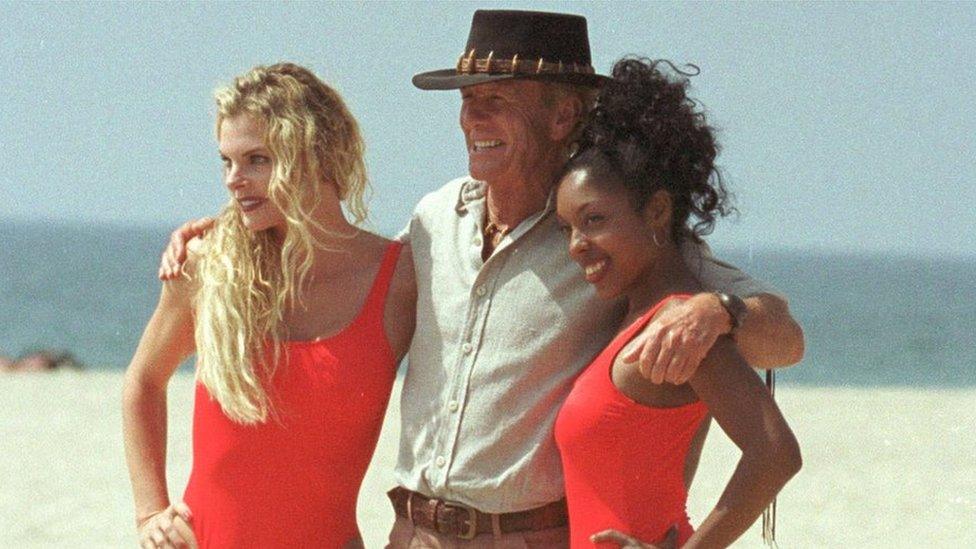Selling a 'lovable' Australia to the US
- Published

The Tourism Australia advert, with Paul Hogan in front of the Sydney Harbour Bridge
Australia has put Crocodile Dundee at the centre of a lavish ad campaign to attract US tourists. Trevor Marshallsea explores why Australia is betting so heavily on a 1980s character - and associations - in 2018.
An unoriginal perpetuation of tired old clichés? Or a stroke of marketing genius?
The response to Australia's revival of tourism advertisements centred on Crocodile Dundee would heavily suggest the latter.
Australia turned back the clock three decades for its new campaign, which peaked with a multi-million dollar advert during American football's Super Bowl on Monday.
The ad, part of a A$36m (£20m; $28m), three-year drive aimed at wooing US tourists, followed a series of teasing clips purporting to be trailers for a remake of Australia's highest-grossing movie.
When the minute-long ad itself aired however, just before half-time in the Super Bowl, it was revealed to be a commercial encouraging visitors to Australia.
Allow YouTube content?
This article contains content provided by Google YouTube. We ask for your permission before anything is loaded, as they may be using cookies and other technologies. You may want to read Google’s cookie policy, external and privacy policy, external before accepting. To view this content choose ‘accept and continue’.
The expense of airing the ad, starring American Danny McBride and Australian Chris Hemsworth, has not been made public, but US reports said a 30-second Super Bowl slot this year cost on average more than $5m.
This left some Australians recoiling at the slug to the taxpayer through government body Tourism Australia, which hopes to boost revenues from American tourists to A$6bn annually by 2020, from a current A$3.7bn.
Others reported a cultural cringe. The ad - showing kangaroos, beaches, the Sydney Opera House and harbour bridge - revived memories of Paul Hogan's successful 1980s commercials inviting Americans to visit so he could "slip another shrimp on the barbie".
The new campaign also portrays more outback characters in the Mick Dundee mould, whereas 89% of Australians live in cities.
Why does it work?
The reception from marketing experts, though, was overwhelmingly a thumbs-up. Tourism Australia was commended for an innovative strategy, with appeal across generations and multi-national reach.
"Australia's tourism ads recently have moved away from the clichés too much, and those campaigns have disappeared up their own backsides," Dee Madigan, creative director of Sydney advertising firm Campaign Edge, told the BBC.
"People actually come to Australia for the opera house, for Uluru. You can't see them anywhere else.

Chris Hemsworth and Danny McBride in a poster released by Tourism Australia
"And yes, the characters in the campaign are over-the-top caricatures, but that's okay. When you've got a short amount of time in an ad you use shortcuts - landmarks, caricatures - you don't have a long time to engage people."
Ms Madigan said recent Australian campaigns had failed because they had overcomplicated tourism and "tried to intellectualise it too much".
There was widespread ridicule for Australia's 2004 campaign featuring a bikini-clad model beseeching tourists with her "where the bloody hell are you?" slogan.
In 2009's "Come Walkabout" campaign, ads made by Australian director Baz Luhrmann showing a troubled New York couple trying to save their marriage on an outback holiday.
"Some of these failed campaigns tried to get into the emotional space of why you travel. It's just not something you can do in an ad," Ms Madigan said.
With the Super Bowl ad seen by 110 million viewers, only a small fraction would need to visit Australia to make investment worthwhile, she said.
Furthermore the campaign has, both before and after Monday's game, sparked widespread connected publicity. Hollywood director Judd Apatow tweeted he wanted to direct a remake. Thor actor Hemsworth, a Tourism Australia ambassador, said he'd be open to starring in one.
Allow X content?
This article contains content provided by X. We ask for your permission before anything is loaded, as they may be using cookies and other technologies. You may want to read X’s cookie policy, external and privacy policy, external before accepting. To view this content choose ‘accept and continue’.
Sydney's Daily Telegraph and Darwin's Northern Territory News (near Mick Dundee's fictional home in Australia's north) have started online petitions demanding a remake. Australian golfing legend Greg Norman urged his Instagram followers to support the idea, posting a picture posing as Dundee.
Tourism Australia said the campaign had a social media reach of 412 million people before the ad aired, with the fake trailers viewed 68.8 million times.
The trailers, which started appearing in mid-January, starred "Aussie-wood" heavyweights including Hugh Jackman, Russell Crowe, Margot Robbie and Isla Fisher. The actors worked for industry minimum fees of less than $20,000 per person, according to Tourism Australia CEO John O'Sullivan.
In explaining a key intention of the campaign, Mr O'Sullivan told Business Insider Australia, external that they wanted to "really [focus] on the people, and the character that makes Australia so lovable to Americans".
Cultural cringe?
Still, enthusiasm for reviving Crocodile Dundee has not been universal. Before the Super Bowl reveal, film critic Luke Buckmaster queried whether a sequel would have a place in 2018, calling the original "sexist, racist, homophobic and transphobic".
"Crocodile Dundee confirmed false preconceptions Americans had (and perhaps still have) about Australia and Australians," he wrote in an opinion piece for The Guardian, external.

Hogan reprising the role in the 2001 film Crocodile Dundee in Los Angeles
However as a tourism campaign it was a proven formula that had "a lot of innovating strategies behind it", according to Dr Rohan Miller, a senior lecturer in marketing at the University of Sydney.
Those included its social media strategy, continued publicity via celebrities such as Apatow, and even the depiction of "warm weather" during a Super Bowl in freezing Minneapolis.
"Crocodile Dundee is still Australia's highest-impact movie in the US," he told the BBC. "A lot of the older market will know it, and it will provoke a lot of discussion with younger Americans, who'll go online and Google it.
"It might be cultural cringe to some, but it's a totally fresh take. The first reaction for some might have been: 'Is this the best we can do?' I think it's the best anyone's ever done, in terms of a marketing campaign for a country."
Trevor Marshallsea is a freelance writer based in Sydney